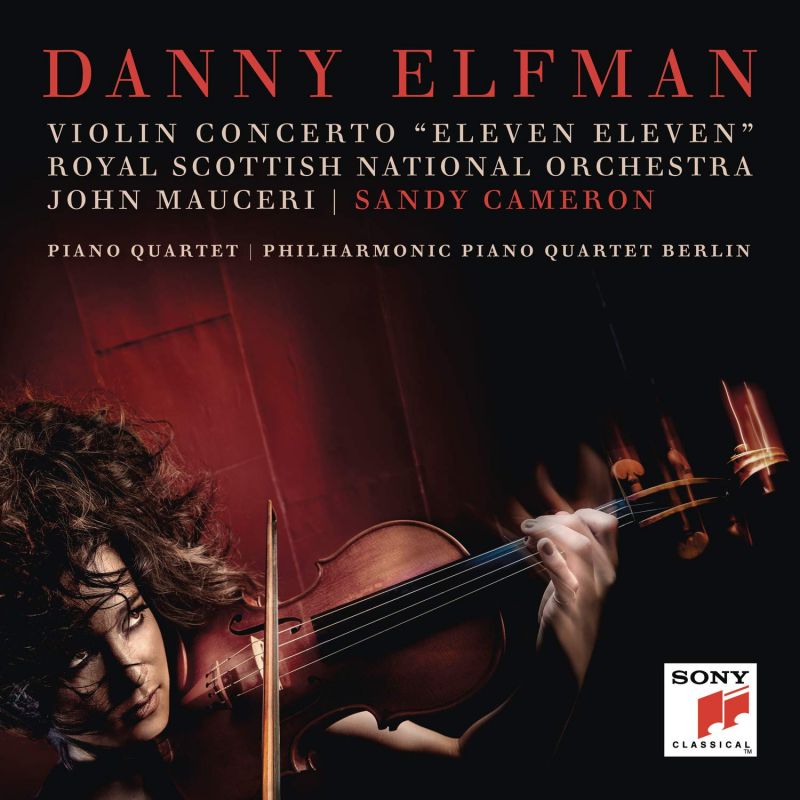ELFMAN Violin Concerto. Piano Quartet (Sandy Cameron)
View record and artist detailsRecord and Artist Details
Composer or Director: Danny Elfman
Genre:
Orchestral
Label: Sony Classical
Magazine Review Date: 06/2019
Media Format: CD or Download
Media Runtime: 65
Mastering:
DDD
Catalogue Number: 19075 86975-2

Tracks:
| Composition | Artist Credit |
|---|---|
| Violin Concerto, ‘Eleven Eleven’ |
Danny Elfman, Composer
Danny Elfman, Composer John Mauceri, Conductor Royal Scottish National Orchestra Sandy Cameron, Violin |
| Piano Quartet |
Danny Elfman, Composer
Berlin Philharmonic Piano Quartet Danny Elfman, Composer |
Author: Edward Seckerson
Elfman is probably best known for his collaborations with the freaky talent that is Tim Burton. They are a supremely effective double-act, a meeting of minds, sensibilities and eccentricities that make them a perfect fit. Indeed, some of the capriciousness that makes Elfman chime so completely with Burton rubs off here. Mostly, though, these accomplished and entertaining pieces owe a lot (as do so many movie scores) to Elfman’s self confessed passion not just for the Romantic classical repertoire as a whole but specifically for the 20th-century Russians.
Shostakovich and Prokoviev loom large in the Violin Concerto Eleven Eleven. There is a distinctly Shostakovian sensibility in the inky lyricism of the opening bars, the bass line brooding over the second idea as the soloist spins arpeggios above. And then we’re off into the Animato hand-in-hand with Prokofiev, whose spiky, mordant humour has much in common with Burton. Indeed, they behave like distant cousins.
Elfman gives his soloist Sandy Cameron plenty to exercise her (they first collaborated on the Cirque du Soleil show Iris) and the solo writing – not least in the cadenzas (gatecrashed in the motor second movement by the percussion section) – is propulsive and exhilarating. On the flipside of the coin is the darkly lyric minimalism of Shostakovich and I like the composerly way in which Elfman has the soloist emerge from the string oration at the start of the third movement ‘Fantasma’ (there’s a movie-derived title if ever there was one), the four-note idea hooking us like the best film cues do.
I wouldn’t want to imply that what Elfman is doing here is writing movie music in all but name – not at all. But I would say that the development within the piece feels motivated by arbitrary changes of mood – as in ‘what next?’ – rather than something more organic. That said, the ‘trip’ is full of incident and the exhilarating climax of the finale shows his prowess and relish for the big gesture but also a deeper instinct by resisting the big finish and returning to the lachrymose beginnings of the piece.
In some ways the Piano Quartet (written at the request of players from the Berlin Philharmonic – now there’s a compliment) feels more like a concert piece in a movie-free zone. Elfman’s restless nature is still pervasive – indeed, it sometimes feels like a latter-day kind of Kinderszenen, with the sinister games of the second movement (‘Kinderspott’) typifying the child in Elfman. Sometimes I wish his music would just settle in one place and simply evolve. Paradoxically, the shortest movement, ‘Ruhe’ (1'40"), does just that – in microcosm.
Discover the world's largest classical music catalogue with Presto Music.

Gramophone Digital Club
- Digital Edition
- Digital Archive
- Reviews Database
- Full website access
From £8.75 / month
Subscribe
Gramophone Full Club
- Print Edition
- Digital Edition
- Digital Archive
- Reviews Database
- Full website access
From £11.00 / month
Subscribe
If you are a library, university or other organisation that would be interested in an institutional subscription to Gramophone please click here for further information.




